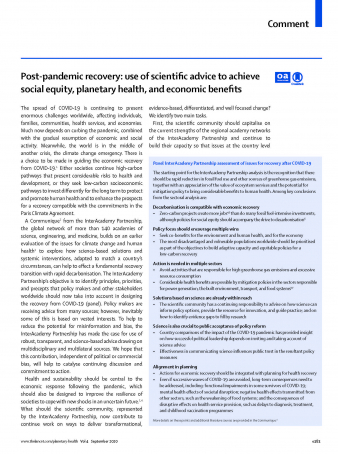The starting point for the InterAcademy Partnership analysis is the recognition that there should be rapid reduction in fossil fuel use and other sources of greenhouse gas emissions, together with an appreciation of the value of ecosystem services and the potential for mitigation policy to bring considerable benefits to human health. Among key conclusions from the sectoral analysis are:
Decarbonisation is compatible with economic recovery
- Zero-carbon projects create more jobs than do many fossil fuel-intensive investments, although policies for social equity should accompany the drive to decarbonisation
Policy focus should encourage multiple wins
- Seek co-benefits for the environment and human health, and for the economy
- The most disadvantaged and vulnerable populations worldwide should be prioritised as part of the objectives to build adaptive capacity and equitable policies for a low-carbon recovery
Action is needed in multiple sectors
- Avoid activities that are responsible for high greenhouse gas emissions and excessive resource consumption
- Considerable health benefits are possible by mitigation policies in the sectors responsible for power generation, the built environment, transport, and food systems
Solutions based on science are already within reach
- The scientific community has a continuing responsibility to advise on how science can inform policy options, provide the resource for innovation, and guide practice; and on how to identify evidence gaps to fill by research
Science is also crucial to public acceptance of policy reform
- Country comparisons of the impact of the COVID-19 pandemic has provided insight on how successful political leadership depends on inviting and taking account of science advice
- Effectiveness in communicating science influences public trust in the resultant policy measures
Alignment in planning
- Actions for economic recovery should be integrated with planning for health recovery
- Even if successive waves of COVID-19 are avoided, long-term consequences need to be addressed, including: functional impairments in some survivors of COVID-19; mental health effects of societal disruption; negative health effects transmitted from other sectors, such as the weakening of food systems; and the consequences of disruptive effects on health service provision, such as delays to diagnosis, treatment, and childhood vaccination programmes

